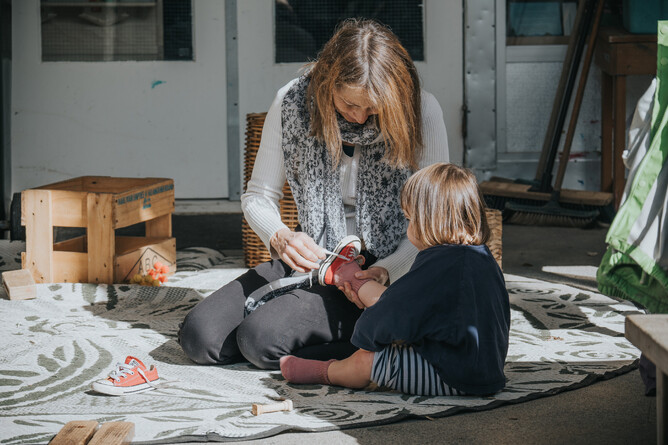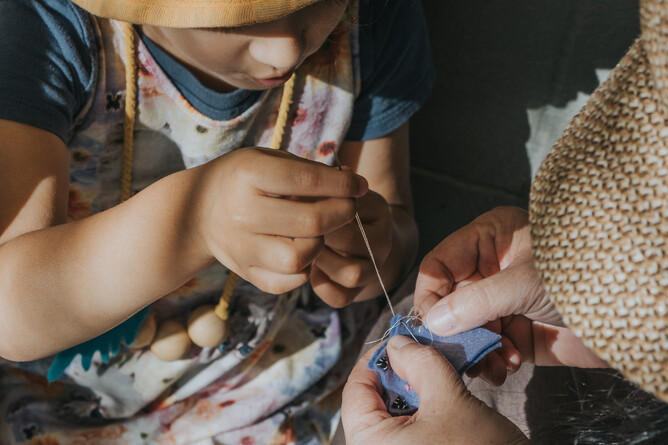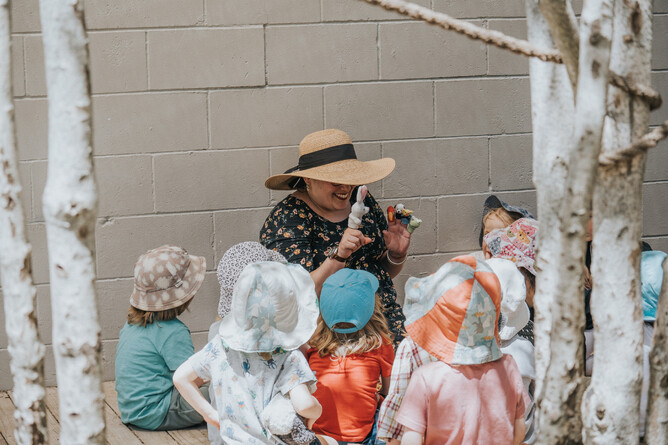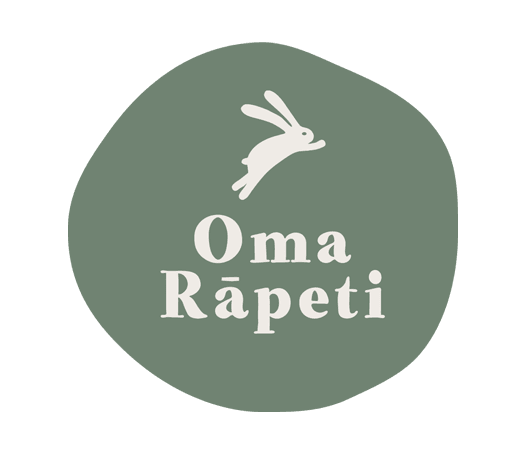What is Gentle Parenting?
Gentle Parenting is a relatively new term that has seen a recent rise in popularity with the help of social media. As consumers and parents, it can be tricky to recognise which parenting philosophies are more than a passing fad and which ones might have a bit more depth to them, possibly even aligning with, and supporting, our own parenting values. This blog offers a brief look at the Gentle Parenting philosophy, its connection to our centre’s philosophy at Oma Rāpeti Freeman’s Bay, and includes some ideas for practical implementation at the end.
What is a parenting philosophy?
A parenting philosophy generally dictates our style of parenting. It may be something we have thought about a lot, it could be a ‘default’ style, or somewhere in between. Our philosophies are grounded in how we believe our children should be raised and this is based on many things, including: our own upbringing and how we were parented, our culture, societal expectations, our understanding of childhood development, what our parenting-friends are doing, and the parenting-related books we’re read/media we’ve consumed.
Some parents have a conscious idea of what their values are and what their parenting style is while others might just go with the flow. Our philosophies can be impacted by other family members’ views, which can sometimes be at odds with our own, and, of course, as imperfect humans, our emotions play a big part in how we parent day-to-day, moment-to-moment.
A note on the terminology
In some ways, the ‘gentle’ label does a disservice to the Gentle Parenting philosophy. ‘Gentle’ can imply softness and even passivity - a light touch that doesn’t leave an impression. This is at odds with one of the philosophy’s core principals of providing clear and consistent boundaries for ourselves and our children. Popular parenting educator, Genevieve Muir, uses ‘Connected Parenting’ as an alternative title because the philosophy encourages deep, connected, reciprocal relationships between parents and their children based on understanding where the child is at both developmentally and in the moment, and what they need from their parents at the given time.
A brief description of Gentle Parenting
Put very simply, Gentle Parenting is parenting without yelling, isolating, and punishing. This is not to say that it’s parenting without anger or frustration - these are very valid emotions - but it’s practising how to process these emotions as parents and connect with our children to help them process their emotions in difficult situations, too.
At its heart, Gentle Parenting emphasises understanding, respect, and empathy rather than shouting at and shaming children, which disconnects us. Rather than viewing challenging behaviours as deliberate defiance, this approach recognises that all behaviour is communication. When your toddler has a meltdown in the supermarket or your four-year-old refuses to leave the playground, they're not trying to be difficult – they're expressing an underlying need or emotion they haven't yet learned to communicate effectively.
Adhering to the Gentle Parenting philosophy can help us become attune to what our child is feeling in that moment, (i.e. we are ‘connected’ with our child), recognise what might be causing their behaviour, (e.g. tiredness, frustration, hunger, etc.), empathise with them, (‘You’re really enjoying playing and I know it’s hard to stop when it’s time to leave…You are feeling really upset…’), and give gentle guidance, (e.g. calmly intervening as necessary, etc.).
Connections with the RIE philosophy
If you are familiar with our childcare centre’s philosophy here at Oma Rāpeti Early Learning Centre Freeman’s Bay, you might recognise the similarity. Gentle Parenting’s approach to raising children resonates deeply with the respectful practices of Magda Gerber and Emmi Pikler and offers a compassionate framework for building strong, lasting relationships with our little ones. Gentle Parenting roots back to the mid-twentieth century at least, so it isn’t especially revolutionary.
Is Gentle Parenting right for you and your child?
The short answer is yes. Anyone can learn how to practice Gentle Parenting techniques and all children can benefit from the connections they make with their parents. Again, the term, ‘gentle,’ can put some people off, especially if they have a child who is all go, go, go. Gentle Parenting does not require a child, (or parent!), with a ‘gentle’ nature! Remember, the definition of gentle here means acknowledging and accepting the child’s emotions and helping them through challenges. Let’s look at a few more specifics.
Key Principles of Gentle Parenting
Setting Clear, Age-Appropriate Boundaries
Boundaries help children feel secure and understood. Instead of saying, ‘stop running!’ we might say, ‘I see you have lots of energy. It’s not safe to run inside at the moment - would you like to run outside in the garden?’ This approach maintains the boundary while acknowledging the child's perspective and offering an alternative in a gentler, but no less firm, way.
Understanding Development
A crucial aspect of Gentle Parenting is recognising that young children are not mini-adults. Their brains are still developing, particularly in areas responsible for impulse control and emotional regulation. When we understand that a two-year-old consistently throwing their food on the floor is driven by a developmental stage and compulsive urge, we can respond with a bit more patience rather than punishment.
Make Connection First
When children feel emotionally connected and secure, they're more receptive to guidance. Taking time to acknowledge feelings before addressing behaviour helps maintain this crucial connection: ‘I can see you're really angry that it's bath time. It's hard to stop playing when you're having fun. Let's take three deep breaths together, and then we can start our bath routine.’
Emotional Coaching and Gentle Guidance
Rather than dismissing or minimising feelings, Gentle Parenting involves helping children identify and process their emotions. This might sound like: ‘You're stomping your feet and your face looks cross. Are you feeling frustrated because your tower fell down? It's okay to feel frustrated. Would you like some help rebuilding it?’
And, ‘I can see you’re really angry but I’m not going to let you hurt your friend…’ while gently inserting yourself to stop the child from hurting another.
The Long-Term View
While Gentle Parenting may require more patience and time in the moment, it helps develop children's emotional intelligence, self-regulation skills, and secure attachment. Children raised with this approach often demonstrate stronger problem-solving abilities, greater empathy, and more confidence in expressing their needs appropriately. They are more likely to seek guidance from you as they grow into older children, teenagers, and beyond, rather than try and conceal problems out of fear of being judged or getting into trouble.
Practical Implementation
- Respond to crying with comfort and understanding, regardless of the reason.
- Allow consequences to happen naturally rather than using punishments.
- Offer choices within acceptable boundaries (two options/choices are usually enough).
- Model the behaviour and emotional regulation you wish to see.
- Create time for special one-on-one connections as much as possible.
- Acknowledge both comfortable and uncomfortable feelings as valid.
It’s about improving, not perfecting
Remember, Gentle Parenting isn't about being perfect – it's about being as present, intentional, and responsive to your child's needs as much as possible. Just as we give children grace as they learn and grow, we must extend the same compassion to ourselves as parents. It’s okay not to get it right every time. For many of us, this style of parenting is completely new and, in moments of stress, it’s really hard to regulate ourselves and focus on maintaining that connection with our child. Once the dust has settled on a situation, we can use these moments to role-model how to repair and reconnect with others. It’s important to take a moment to show our children that we regret how we might have behaved when we were angry or frustrated, check in with how our child is feeling, and talk about how we might do better next time we feel stressed. (See our blog on saying sorry here).
For parents and whānau interested in learning more about Gentle Parenting or the RIE philosophy, we welcome conversations about how we can support you. We can share insight into children’s brain development and behavioural urges and offer you advice on how to gently intervene when challenging situations arise with your child. Please reach out to your kaiako and we can work together to nurture confident, resilient, and emotionally intelligent tamariki.




